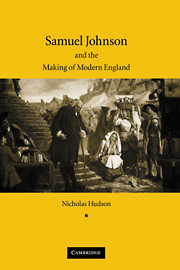Book contents
- Frontmatter
- Contents
- Acknowledgments
- Introduction
- 1 From “rank” to “class”: the changing structures of social hierarchy
- 2 Constructing the middle-class woman
- 3 From “Broad-bottom” to “party”: the rise of modern English politics
- 4 “The voice of the nation”: the evolution of the “public”
- 5 The construction of English nationhood
- 6 The material and ideological development of the British Empire
- Conclusion
- Notes
- Bibliography
- Index
5 - The construction of English nationhood
Published online by Cambridge University Press: 31 August 2009
- Frontmatter
- Contents
- Acknowledgments
- Introduction
- 1 From “rank” to “class”: the changing structures of social hierarchy
- 2 Constructing the middle-class woman
- 3 From “Broad-bottom” to “party”: the rise of modern English politics
- 4 “The voice of the nation”: the evolution of the “public”
- 5 The construction of English nationhood
- 6 The material and ideological development of the British Empire
- Conclusion
- Notes
- Bibliography
- Index
Summary
ENGLAND AND THE FULFILMENT OF NATIONAL DESTINY
“Many will start,” writes Boswell, upon reading Johnson's famous statement in 1775: “Patriotism is the last refuge of a scoundrel.” He goes on to defend Johnson against the suspicion that he merely dismissed the worth of loving one's country: “let it be considered, that he did not mean a real and generous love of our country, but that pretended patriotism which so many, in all ages and countries, have made a cloak for self-interest.” Johnson's apparent dismissal of “patriotism” nonetheless remains among his most notorious statements. It apparently confirms that the study of his life and thought should not be confined to a narrowly “English” context, for he was skeptical of English contemporaries prejudiced in favor of their homeland, taking an admirably “extensive view” (l. 1, 6:91), as he wrote in “The Vanity of Human Wishes,” of human affairs. According to one influential argument, as articulated by Robert DeMaria and others, Johnson is best seen as a figure attached as much to the intellectual world of the European Continent, with its deep roots in Renaissance humanism, as to the world of contemporary or ancient England. We are nonetheless faced with the complication that Johnson did become a virtually iconic Englishman for the Victorians, a tradition that still endures in his popular reputation and at the houses devoted to his memory in London and Lichfield.
- Type
- Chapter
- Information
- Samuel Johnson and the Making of Modern England , pp. 133 - 169Publisher: Cambridge University PressPrint publication year: 2003
- 1
- Cited by

